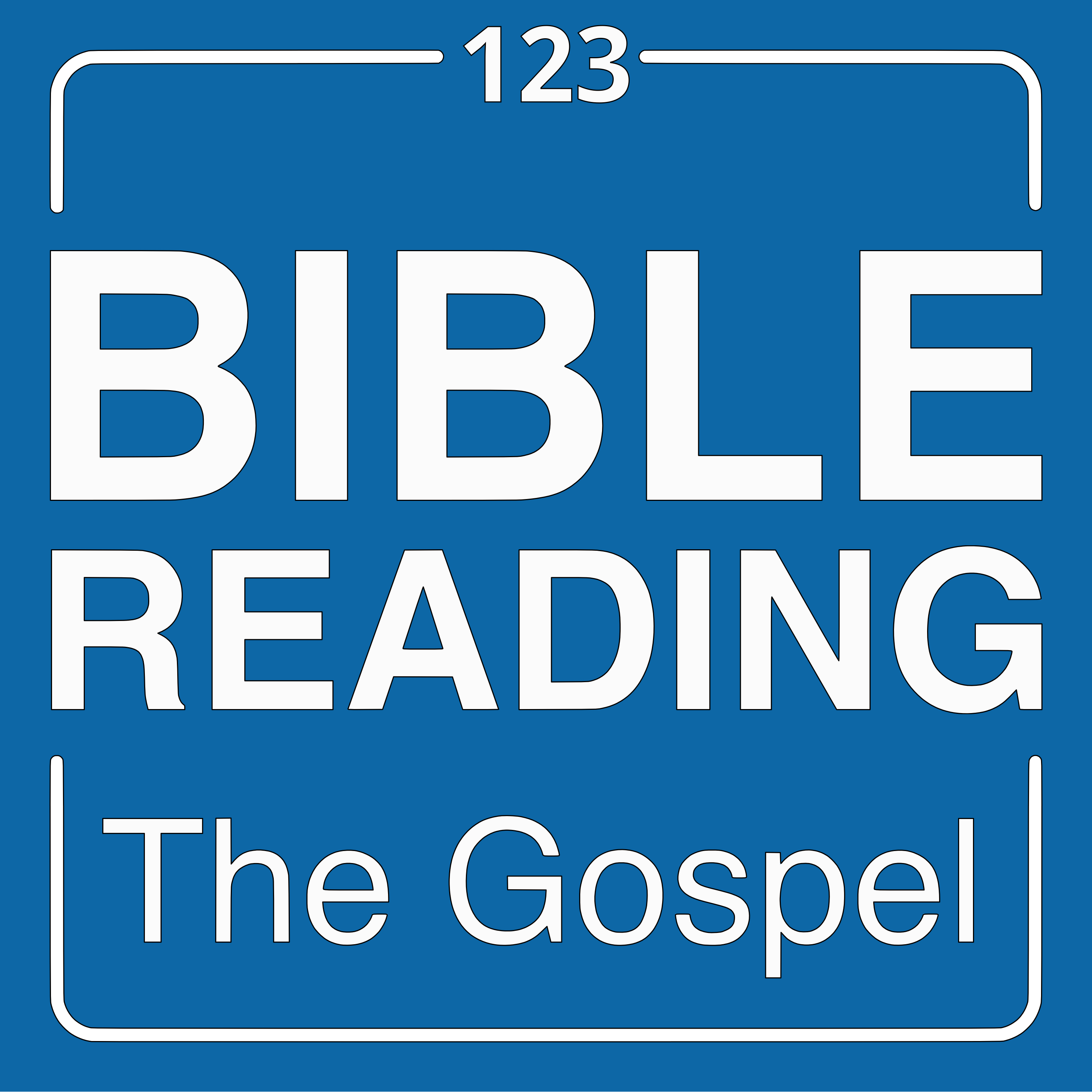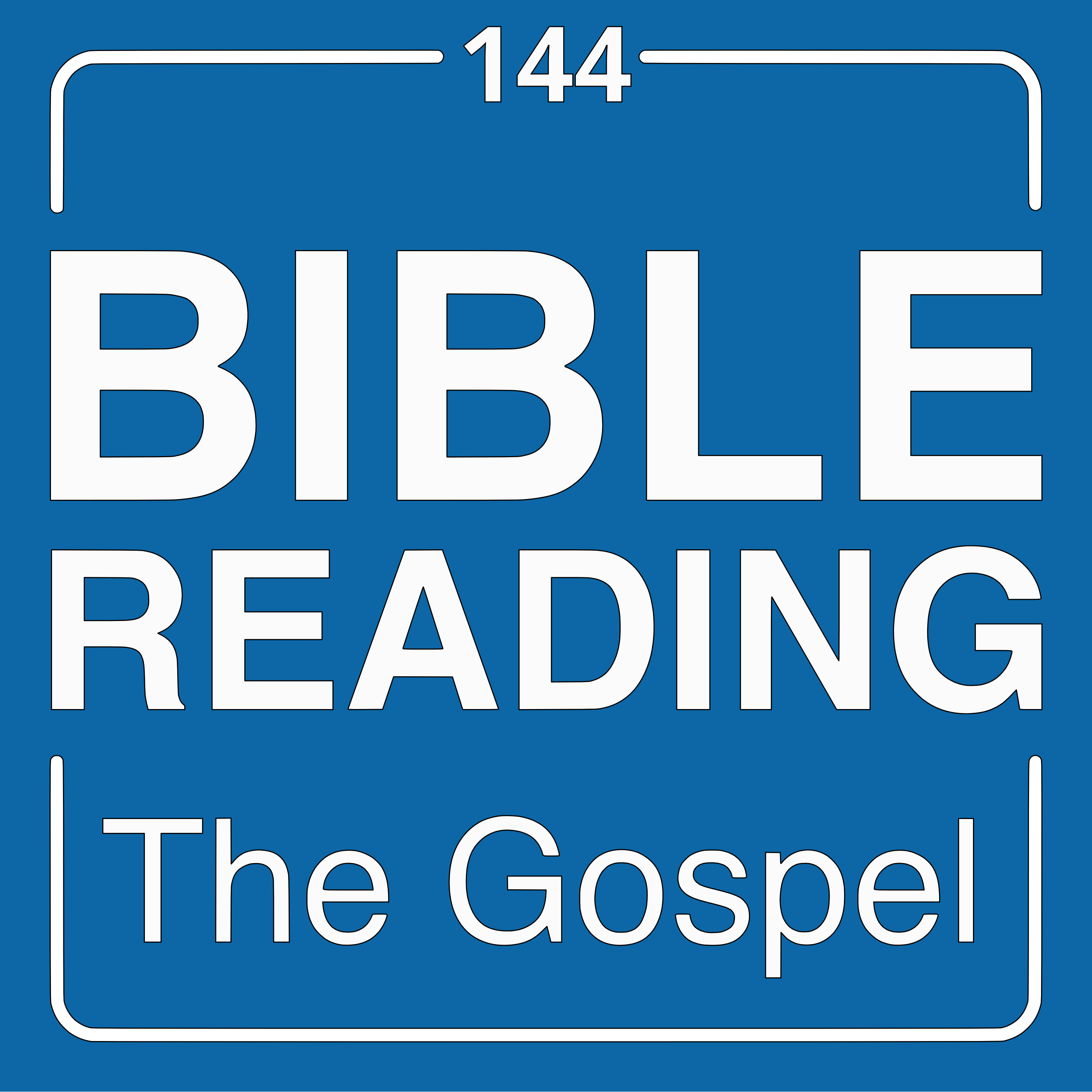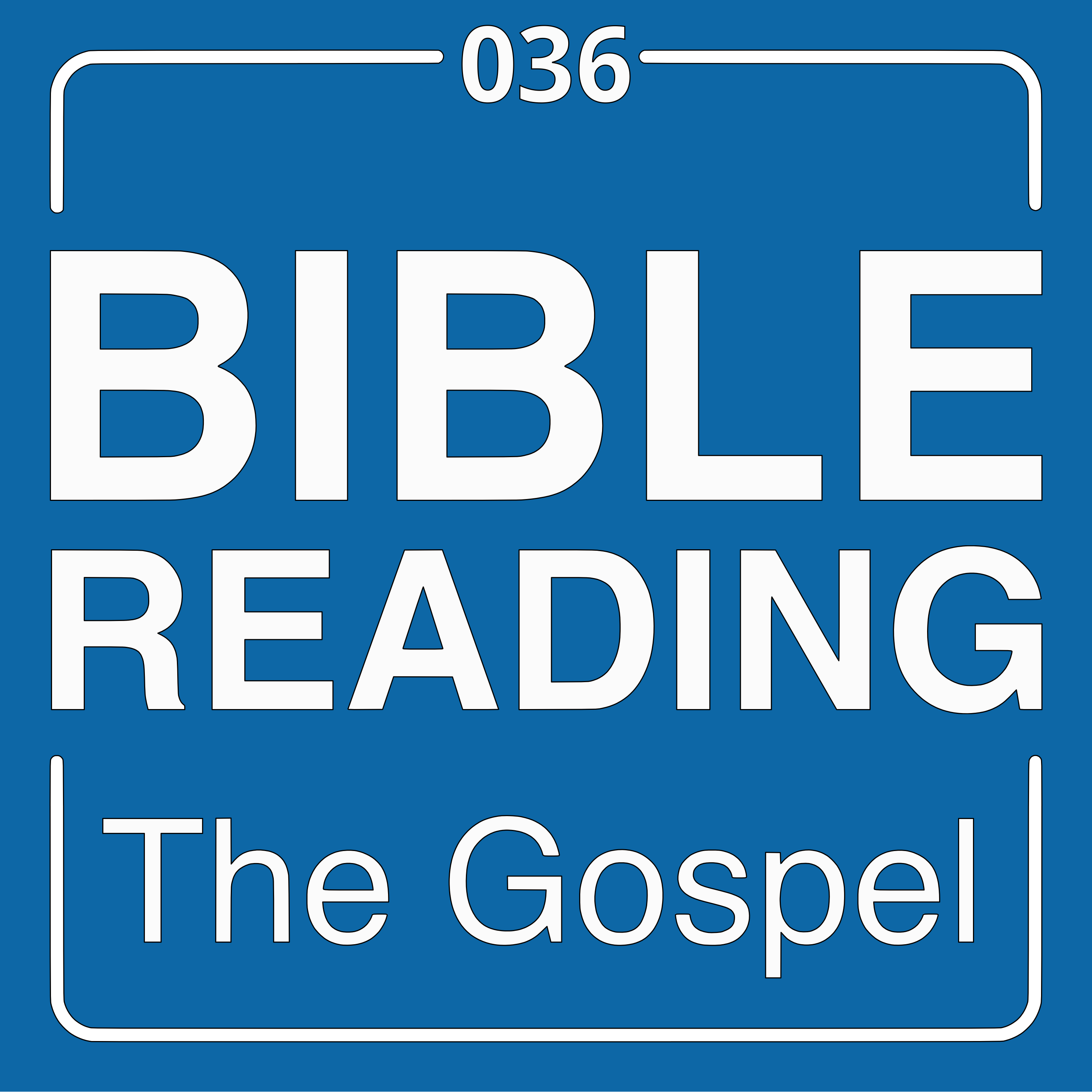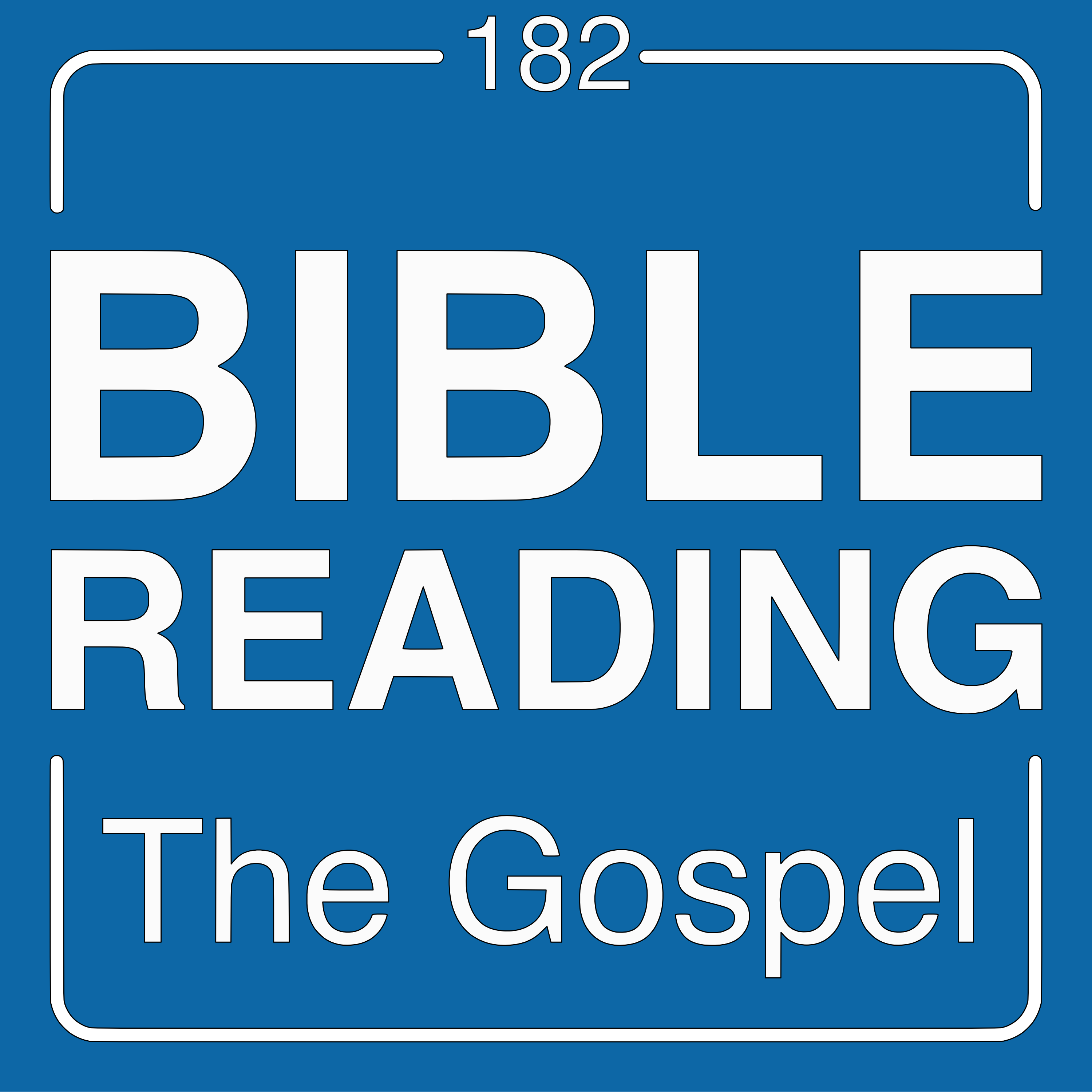Episode Transcript
[00:00:24] Speaker A: Hi, I'm Josh.
[00:00:25] Speaker B: And I'm Gabriel.
[00:00:26] Speaker A: Today on reading the gospel, we are studying the event the prodigal son. This event is found in Luke, chapter 15. And we will be reading from verse eleven and reading through the end of the chapter. Follow along with us as we read.
[00:00:45] Speaker B: And Jesus said, there was a man who had two sons, and the younger of them said to his father, father, give me the share of property that is coming to me.
And he divided his property between them.
Not many days later, the younger son gathered all he had and took a journey into a far country.
And there he squandered his property in reckless living.
And when he had spent everything, a severe famine arose in that country, and he began to be in need.
So he went and hired himself out to one of the citizens of that country, who sent him into his fields to feed pigs.
And he was longing to be fed with the pods that the pigs ate. And no one gave him anything.
But when he came to himself, he said, how many of my father's hired servants have more than enough bread? But I perish here with hunger.
I will arise and go to my father, and I will say to him, father, I have sinned against heaven and before you, I am no longer worthy to be called your son. Treat me as one of your hired servants.
And he arose and came to his father.
But while he was still long way off, his father saw him and felt compassion and ran and embraced him and kissed him. And the son said to him, father, I have sinned against heaven and before you, I am no longer worthy to be called your son.
But the father said to his servants, bring quickly the best robe and put it on him and put a ring on his hand and shoes on his feet and bring the fatted calf and kill it, and let us eat and celebrate. For this my son was dead and is alive again. He was lost and is found. And they began to celebrate.
[00:02:56] Speaker A: Now his older son was in the field, and as he came and drew near to the house, he heard music and dancing. And he called one of his servants and asked what these things meant. And he said to him, your brother has come, and your father has killed the fatted calf, because he has received him back safe and sound. But he was angry and refused to go in. His father came out and entreated him. But he answered his father, look, these many years I have served you, I have never disobeyed your command. Yet you never gave me a young go that I might celebrate with my friends. But when this son of yours came, who has devoured your property with prostitutes. You killed the fatted calf for him. And he said to him, son, you are always with me. And all that is mine is yours. It was fitting to celebrate and be glad for this. Your brother was dead and is alive. He was lost and is found.
This has to be one of the famous parables that Jesus tells. At least I should say. As a teenager, I heard this story told time and time again.
And it is one that holds a special place in my heart. It's called the parable of the prodigal son. But is that the most accurate title?
[00:04:26] Speaker B: We can call it the parable of the prodigal sons.
Because not only the younger was lost, but also the older was lost. He was close to his father. He was in his father's field, obeying his commandments. But his father was not in his heart, you see that he was thinking just about friends. He was always looking forward to celebrate with them.
But he was postponing those desires. He was smarter than a younger son.
He was postponing those desires for after his father would die.
[00:05:05] Speaker A: Yeah.
So this is really a story of two prodigal sons. And the background to these stories, again, remind us of the background. Who is Jesus telling this parable to?
[00:05:19] Speaker B: At the beginning of this chapter, chapter 14, we have those verses that tax collectors and sinners were coming close to Jesus Christ. And the Pharisees and the scribes grumbled, saying, this man receives sinners and eats with them. And Jesus Christ used this series of three parables to show them that you can be lost even if you are in God's pasture, even if you are in God's house. As the second parable of the lost coin.
And with the third one, you can be lost even if you are obeying the letter of God's commandments. Without having a relationship, without having God in your heart.
[00:06:09] Speaker A: And so what is playing out in real life, as Jesus is telling the parable. Is really what's playing out in the parable. Because it's the sinners who are coming back. They're coming back to Jesus. And the religious leaders are pushing them away and saying, no.
[00:06:28] Speaker B: So practically, Jesus was casting this positive vision, okay, you are lost, but you can come back. Because the main theme of all these parables is lost and found.
Also, it's very interesting. There is a crescendo starting a little bit low.
Only one from hundred sheep was lost in the first parable. In the second, the percentage of lost value increases to 10%.
One of ten. And now, what is the percentage in the last parable is not only 50%, as the traditional title suggests, maybe 100%.
[00:07:12] Speaker A: What the Son is asking the father to do, the first son, is very disrespectful.
It's basically, you should drop dead or I'm not happy here.
I'm waiting for you to die so I can get my stuff and get out of here.
[00:07:29] Speaker B: Because in those times, primal and Middle east, as in many places today, the state was divided only after the owner. In this situation, the father would die.
[00:07:42] Speaker A: And it was the firstborn son who got the majority of it in the jewish tradition, who would then care know, because you don't want to just divide up the property. If you divide up a piece of property small enough, it's useless.
And I think our family owns a piece of property in samoa, and I might have like a foot of ground divided up, and it's divided up amongst everyone, so it's pointless at that point. There's not enough to have everything. So by giving the majority to the first born son, it could keep the business, the livelihood together.
[00:08:26] Speaker B: And I want to build on what you just said. By giving a double portion to the older son, the father will pass on the spiritual leadership and will say, I wanted to focus more to become the next spiritual leader of the family.
So you'll have a double portion of the property, so we don't have to work that hard, so you'll have time for the spiritual matters. In this situation, the older son is even more responsible than the younger son. He better represents the jewish nation than the younger son.
[00:09:02] Speaker A: And so the younger son does as many people do when he's old enough to make his own decisions. He chooses not to follow the upbringing he was taught. He chooses to go out on his own, and he squanders the money in reckless living until he depletes his resources. And when he depletes his resources, he then goes down to the gutter.
[00:09:33] Speaker B: No more friends, no more friends, no more parses.
[00:09:37] Speaker A: And I said, this hits home because I've been there. I depleted my resources and I found myself in the gutter, and that's where I found God. That's where I came back. So I'm one of those ones that can say, I've got the prodigal son story, but Jesus was there.
I didn't have to get up and go somewhere. He was there in the gutter for me. And I think that's the wonderful story. Here we have the son returning home, but the father is watching. And when the father.
[00:10:10] Speaker B: And waiting.
[00:10:11] Speaker A: Yeah, the father takes off running for him to go get him. And it's a beautiful story of forgiveness, grace, mercy, redemption in and of itself. It's a phenomenal story of how much God loves us.
[00:10:30] Speaker B: So imagine the prodigal son when he feels the embrace of the father.
Everything goes away. There is no more shame that you come home and the servants of your father are better dressed than you are.
When you feel the embrace of God, the past dissipates, the hope comes back.
That is the moment when most of us have experienced that turning point in life, when we felt that we are in God's arms. And that is the safest and the best place in the whole universe.
[00:11:13] Speaker A: And I think it's important just to note in passing that the forgiveness that we receive, it's unmerited.
And we don't need to keep going back and asking and apologizing. I'm sorry for this. I'm sorry for this. Once we're forgiven, we're forgiven. And so this son is brought in as a son. He's given this feast.
But we finish the story with the other Son, and he's not happy.
Where is this conversation taking place? Like, does the Son come into the party?
[00:11:48] Speaker B: No, the conversation takes place outside of the house, maybe close to the threshold of the entrance door. It seems that the door is closed and the father went outside to talk to his son.
And compared with the previous two stories, the lost sheep and the lost coin, the end is kind of split. Yes, it is happy, but inside, but it is sad outside.
[00:12:20] Speaker A: We don't know whether the sun goes in or not. Why doesn't Jesus wrap it up nicely for us?
[00:12:26] Speaker B: Because from all these three parables with four characters, right, lost sheep, lost coin, and two lost sons, the older son, who received a double portion of inheritance, seems to represent the jewish nation the best.
And this is an appeal for the jewish nation to come back, to look at the tax collectors and the prostitutes as being prodigal sons and daughters, received into God's arms, valued and appreciated.
Forgiveness is unfair, right? Forgiveness is not something that is just or fair. It is a grace. And grace always goes beyond fairness.
But the jewish nation still had some weeks until the crucifixion of Jesus Christ. This is why the story does not end in a specific way. It is still open for them to reconsider. It's an invitation to come back.
It is a strong appeal for the jewish nation in a very veiled way.
[00:13:40] Speaker A: And so that invitation is open to us today. Whether we are the first of the sons and we're out, we've gone away from God. We find ourselves in a pig heap or in a place where we don't want to be.
We can call out to God and come back to God, and he will forgive us and lift us back up, restore us to the title sons and daughters of God.
[00:14:08] Speaker B: In all these three parables, there is an active, intentional seeking for the lost value, and that represents God in an amazing way. It is God who searches for us as the shepherd for the lost sheep. It is God that cleans the house and turn on the light and sweep the house like the woman in the second parable. And God is like the Father, who is both inside to rejoice with some and is outside still appealing for others to come in, to reconsider, to see God with different eyes. It is God outside talking to the older son, saying, son, everything I have is yours. You have me always with you.
[00:14:59] Speaker A: Let's pray.
Father, we are so thankful that the door to the house is open, that a way is made for us to come to you, that today we have not gone too far away, that you cannot save us.
And Father, wherever we are at, may we make that decision right now to come back to you. May we make that decision to be found, to be saved, to be in your presence.
[00:15:31] Speaker B: Amen.
[00:15:32] Speaker A: Because we do not know how long we have to make choices. We do not know if we will have one more day on this earth to continue to make these choices. May we use the time today that we've given to say yes in Jesus name, amen.



